Organizational and Leadership Development
Jewish institutions have an important role in supporting Jewish life and community. Our studies of organizational and leadership development are aimed at helping the Jewish community recognize and utilize new ideas, enact best practices, and adapt to a changing world.
Hillel International’s flagship program for early career professionals, the Springboard Fellowship, is the subject of one of CMJS’ longstanding evaluation studies. As the largest early career incubator in the Jewish community, Springboard supports a cohort of young adults who serve as campus engagement professionals. The Fellowship provides ongoing professional development to support their work, Jewish learning, and personal growth. The program aims to motivate participants to pursue a professional path in Hillel and/or the Jewish nonprofit sector. CMJS conducted the first surveys of Springboard participants and alumni in 2018. The surveys help HIllel learn how the program is evolving and the extent to which alumni pursue a professional path in the Jewish community.
How synagogues function and evolve has also been a subject of CMJS research. Hundreds of congregational evaluations have been conducted throughout the United States.
For a list of related publications in these research areas, please see below.
Leadership Development
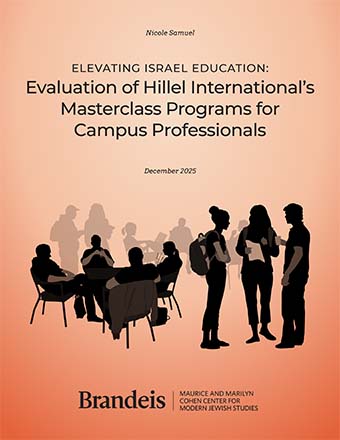
Report
December 2025
Masterclass: Israel (MCI) and Masterclass: Israel Xperience (MCIX) are initiatives of Hillel International’s Center for Jewish and Israel Education that aim to strengthen and improve campus professionals’ knowledge, skills, and confidence related to contemporary Israeli society and the Israeli-Palestinian conflict. Both MCI and MCIX are small cohort-based programs that emphasize teaching multiple perspectives and narratives about Israel and the Israeli-Palestinian conflict.
The report is based on findings from a multi-year, multi-method study of MCI and MCIX designed to assess change and growth over time in three core areas of professional learning: knowledge of contemporary Israel and the Israeli-Palestinian conflict, skills related to campus pluralism and educational pedagogy, and confidence engage in this work with students and colleagues. The study focuses on three cohorts of MCI: Cohort III (spring 2022), Cohort IV (spring 2023), and Cohort V (spring 2024), as well as one cohort of MCIX participants (August 2023).
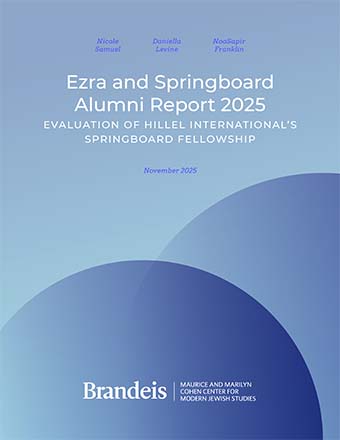
Report
November 2025
This report is the most recent in a program of evaluation of Hillel International’s Springboard Fellowship, Hillel's flagship program for early career professionals and the largest career incubator program in the Jewish community. The report includes the findings from the annual survey of Springboard alumni from seven cohorts (Aleph through Zayin, 2016-24), along with participants of Hillel’s Ezra Fellowship (2014-18). The report also focuses on the post-Fellowship experiences of alumni from Springboard’s Ezra Jewish education track.
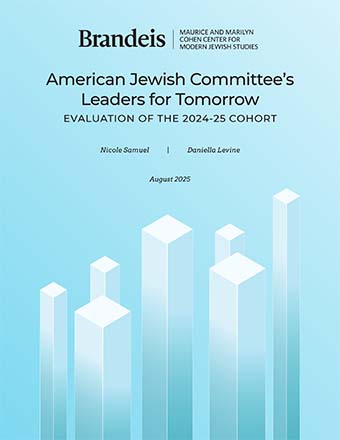
Report
August 2025
Leaders for Tomorrow (LFT) is American Jewish Committee’s (AJC) seven-month cohort-based education and advocacy program for Jewish high school students. The programs aims to prepare teens with advocacy skills, increased content knowledge about Israel and antisemitism, confidence discussing these issues, and strengthened Jewish identities. This report describes LFT participants in the 11 AJC regions and one national virtual cohort offering the program in 2024-25. To measure growth and change over time, the study examined participants’ views and knowledge prior to beginning the LFT program and at the end of the program.
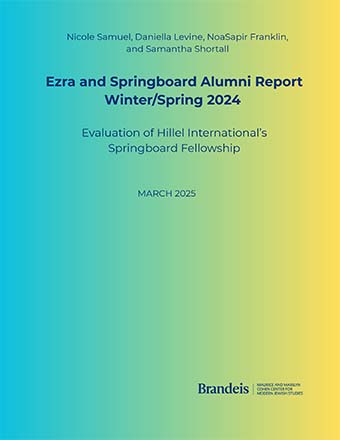
Report
March 2025
Nicole Samuel, Daniella Levine, NoaSapir Franklin, and Samantha Shortall
Hillel International’s Springboard Fellowship for early career professionals is part of Hillel’s efforts to build a talent pipeline for the movement and the Jewish nonprofit sector overall. This report includes findings of alumni surveys fielded in winter/spring 2024 to Ezra Fellowship alumni and to participants in six Springboard cohorts: Aleph, Bet, Gimel, Dalet, Hey, and Vav. The report focuses on participants’ post-Fellowship professional growth and leadership trajectories, including on employment, graduate studies, career advancement and considerations, professional development activities, continued connections to Hillel and the Fellowships, and participation in Jewish life and leadership.
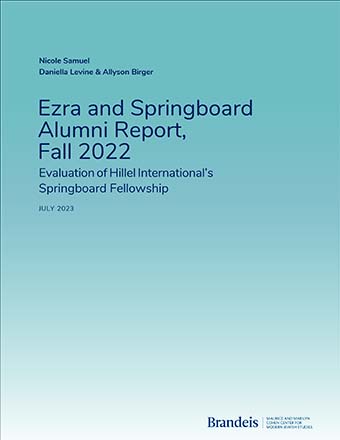
Report
July 2023
Nicole Samuel, Daniella Levine, and Allyson Birger
The Springboard Fellowship is Hillel International’s flagship program for early career professionals. As the largest early career incubator in the Jewish community, Springboard aims to cultivate and identify emerging professionals who will apply their talents on campus with Hillel for two years and may be inspired to continue on a professional path in Hillel and/or the Jewish nonprofit sector. This report looks at where Ezra Fellowship and Springboard alumni are as of fall 2022, including their current employment and graduate studies status, career advancement, participation in professional development, continued connections to Hillel and the Fellowships, and involvement in Jewish life and leadership.
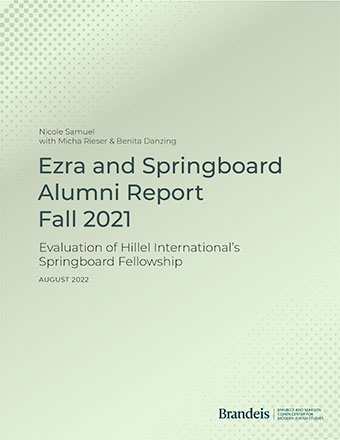
Report
August 2022
Nicole Samuel with Micha Rieser and Benita Danzing
The Springboard Fellowship is the largest early career incubator in the Jewish community. More than 240 professionals have participated in Springboard's six cohorts since the Fellowship began in 2016. This report presents the results of the annual study of Springboard and Ezra Fellowship alumni. The annual surveys are an opportunity for understanding the long-term impact of the programs on professional development and decisions around career and leadership.
The surveys, fielded in fall 2021, included questions on employment and graduate studies, future career interests, and Jewish life and leadership. Also included were questions on the impact of the COVID-19 pandemic on professional decisions. Just as the world has changed since the research began in 2018, much has also changed for the Springboard program. The alumni data show the impact of the changes and the potential for program growth.
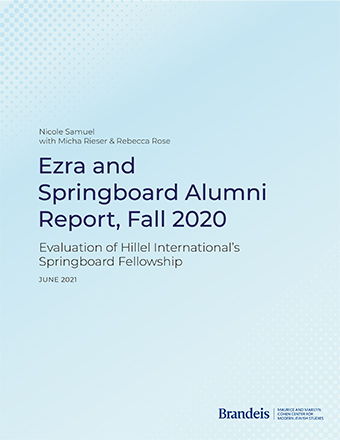
Report
June 2021
Nicole Samuel with Micha Rieser and Rebecca Rose
The Springboard Fellowship is Hillel International’s flagship program for early career professionals. Springboard was preceded by the Ezra Fellowship for early career Jewish educators, and the two programs merged in 2018. This report presents a portrait of Ezra and Springboard alumni, who represent different lengths of time post fellowship, ranging from four months to eight years. The surveys conducted in fall 2020 asked alumni about employment and graduate studies, work history and career advancement, post-fellowship connections and activities, and current leadership positions.
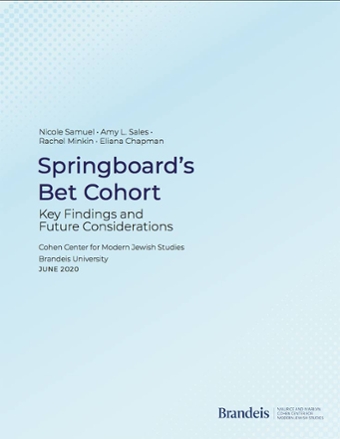
Report
June 2020
Nicole Samuel, Amy L. Sales, Rachel Minkin, Eliana Chapman
Springboard is Hillel International’s two-year professional development fellowship for recent college graduates. The aims of the Fellowship are to identify and cultivate emerging professionals, to motivate them to apply their talents to the Jewish sector, and to build a talent pipeline for Hillel and beyond. Bet cohort is the focus for the Springboard evaluation because it represents the Fellowship at a liminal point in its evolution—after the initial test case (Aleph cohort) and before scaling (Gimel cohort).
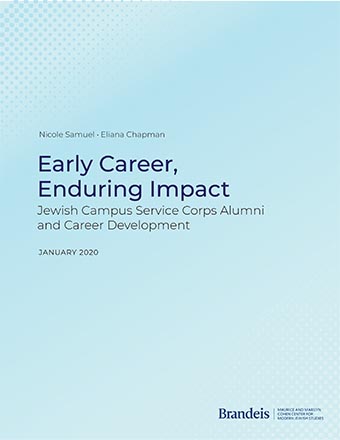
Report
January 2020
Nicole Samuel and Eliana Chapman
In the years between 1994 and 2008, Hillel International’s Steinhardt Jewish Campus Service Corps Fellowship (JCSC) brought hundreds of recent graduates to college campuses to engage uninvolved or under-involved students in Jewish life. This research is the first systematic study of JCSC alumni and explores the Fellowship’s long-term impact.
December 2011
Report
Amy L. Sales
The mapping project focused on Jewish education from preschool through college. The work entailed: (1) interviewing the executives of national agencies and foundations concerned with Jewish youth education; (2) studying the philosophy and delivery of Jewish education in eight communities; and (3) building a database of organizations and programs devoted to Jewish youth education at the national level and in the eight communities of our study. All total, we interviewed about 170 individuals and gathered basic descriptive information on over 5,000 programs and organizations. Mapping Jewish Education: The National Picture presented current conditions and future trends in the field. It described the role played by foundations in the development of Jewish education and suggested what a Jewish education system—comprised of agencies, organizations, federations, philanthropists and foundations—might look like. Mapping Professional Development for Jewish Educators summarized the desirable and necessary features for effective professional development and examined current opportunities available to Jewish educators. Juxtaposing the two revealed possibilities for future growth and improvement in professional development for Jewish educators.
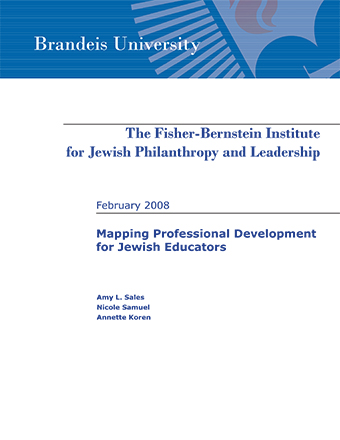
Report
February 2008
Amy L. Sales, Nicole Samuel, and Annette Koren
This report describes professional development efforts in Jewish education, beginning with a list of desirable and necessary features for effective professional development in education. The report also discusses current professional development opportunities in Jewish education by sub-sector (i.e., camp, year-round informal education, Hillel, day school, congregational school, and Israel). Possibilities for future expansion and improvement of professional development efforts are proposed.
Report
2006
Amy L. Sales, Leonard Saxe, Joseph Reimer, , , and Nicole Samuel
This report lays out the various roles that are and can be played by federations,foundations, and agencies to create a strong educational system for the Jewish community. It also explores various issues faced by foundations in their funding of education.
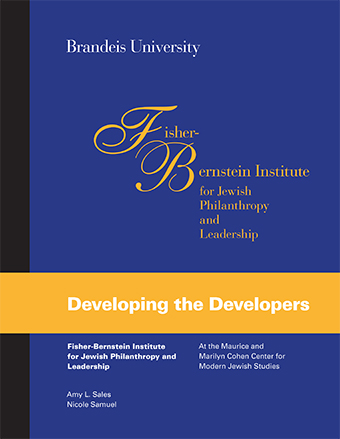
Report
April 2007
Amy L. Sales and Nicole Samuel
This report is concerned with the sources of difficulties in the fundraising profession—with its high rates of burnout, turnover, and new hires One of its goals is to document and analyze the fundraiser shortage, both in the Jewish community and in the nonprofit sector more broadly. A second goal is to understand the strategic thinking of those who have recognized the problem and begun to tackle it.
Report
2005
Shaul Kelner, Michael Rabkin, Leonard Saxe, Leonard, and Carl Sheingold
This report collected data from over 1,400 workers employed in almost 200 Jewish organizations, synagogues, and schools in six US communities to inform discussions of human resource policies that can strengthen Jewish organizations.
Organizational Development
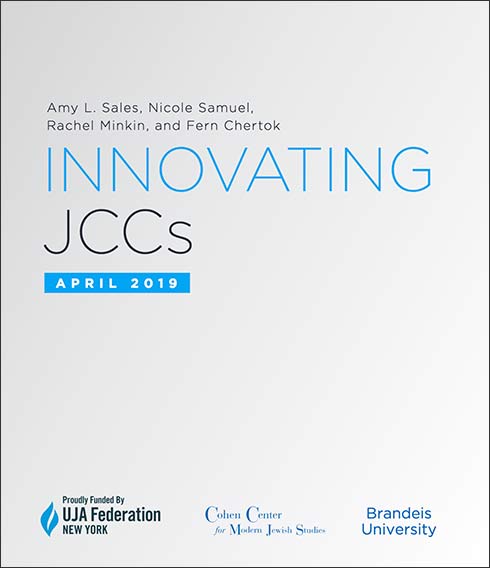
Report
May 2019
Amy L. Sales and Nicole Samuel
The mid-20th century Jewish community center was built on the model of a brick-and-mortar, full-service, membership-based community center. This model is increasingly out of step with today’s reality. The purpose of the Innovating JCCs study was to seek out new ideas in the field and identify ways that JCCs might break through the old model to become successful 21st century agencies.
Report
January 2006
Mark I Rosen. Case Analysis by Amy L. Sales
All nonprofits have to manage issues related to leadership and succession, change, innovation, strategic alliances, stakeholder relations, governance, organizational design, and organizational culture. In its recent history, Hillel: The Foundation for Jewish Campus Life, has addressed these issues in ways that can be instructive for other organizations. This Hillel case study offers insights into the dilemmas and challenges faced by leaders of nonprofit organizations.